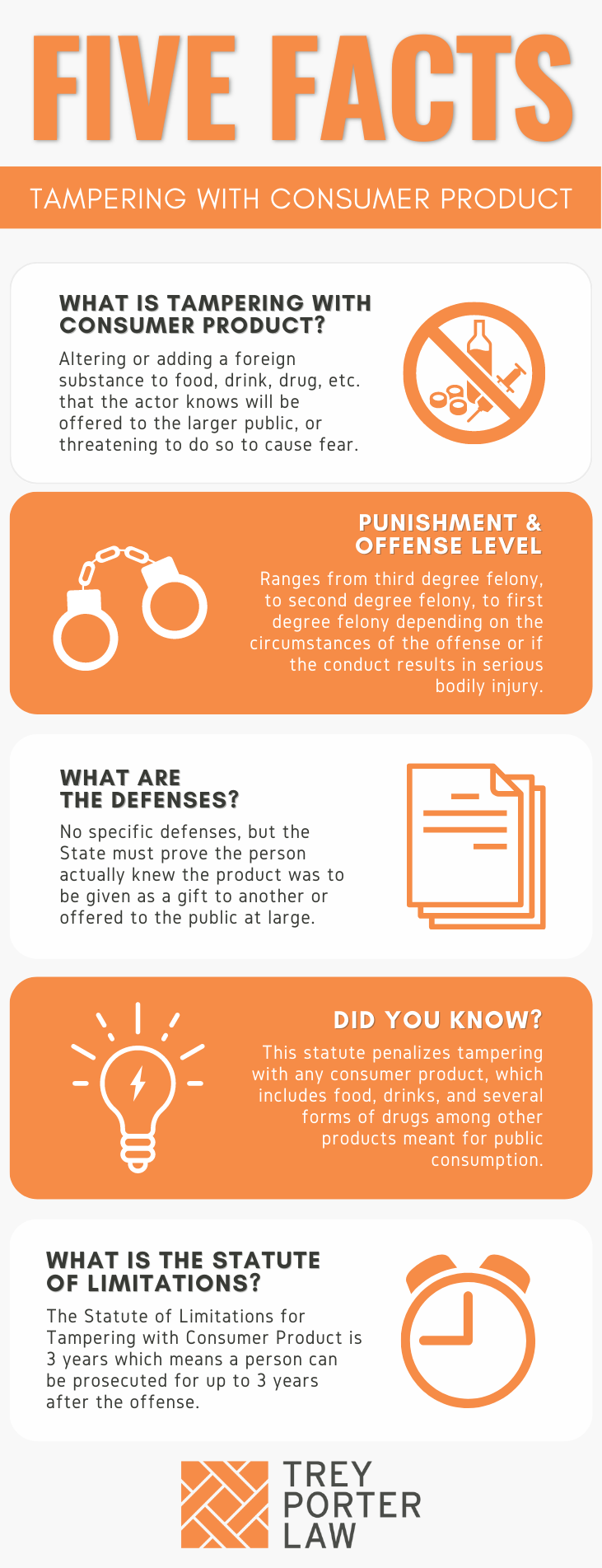WHAT IS TAMPERING WITH CONSUMER PRODUCT IN TEXAS?
The Texas law against tampering with a consumer product prohibits altering or adding a foreign substance to any food or drugs that will be sold or given to another person or the general public.

WHAT IS THE TAMPERING WITH CONSUMER PRODUCT LAW IN TEXAS?
Tex. Penal Code § 22.09. TAMPERING WITH CONSUMER PRODUCT.
(b) A person commits an offense if he knowingly or intentionally tampers with a consumer product knowing that the consumer product will be offered for sale to the public or as a gift to another.
(c) A person commits an offense if he knowingly or intentionally threatens to tamper with a consumer product with the intent to cause fear, to affect the sale of the consumer product, or to cause bodily injury to any person.
(d) An offense under Subsection (b) is a felony of the second degree unless a person suffers serious bodily injury, in which event it is a felony of the first degree. An offense under Subsection (c) is a felony of the third degree.
WHAT IS THE PENALTY CLASS FOR TAMPERING WITH CONSUMER PRODUCT IN TEXAS?
The penalty category for tampering with a consumer product depends on the person’s intent, and resulting harm. Tampering with a consumer product is a:
- Third degree felony, punishable by two to ten years in prison, if the person threatens to tamper with a consumer product with intent to:
- cause fear;
- affect the sale of the consumer product; or
- cause bodily injury to any person;
- Second degree felony, punishable by two to 20 years in prison, if:
- the person tampers with the product knowing it will be offered for sale to the public or as a gift to another;
- First degree felony, punishable by five to 99 years or life in prison, if:
- anyone suffers serious bodily injury as a result of the person’s product tampering.
WHAT IS THE PUNISHMENT RANGE FOR TAMPERING WITH CONSUMER PRODUCT IN TEXAS?
Threatening to tamper with a consumer product charged as a third degree felony carries a possible prison sentence between two and ten years. Tampering with a consumer product charged as a second degree felony carries between two to 20 years in prison. If tampering with a consumer product is charged as a first degree felony, the person faces a possible five to 99 years or life in prison. All felonies carry a maximum fine of $10,000.
WHAT ARE THE PENALTIES FOR TAMPERING WITH CONSUMER PRODUCT IN TEXAS?
A person charged with tampering with a consumer product may be eligible for probation after a conviction, or deferred adjudication without a conviction, for a period not to exceed ten years.
WHAT ARE THE DEFENSES TO TAMPERING WITH CONSUMER PRODUCT IN TEXAS?
The statute does not provide for specific defenses to tampering with a consumer product. A person accused thereof may assert any defense in an attempt to negate at least one of the elements the State must prove at trial. For example, an accused may argue he or she lacked the requisite knowledge or intent to commit the crime.
WHAT IS THE STATUTE OF LIMITATIONS FOR TAMPERING WITH CONSUMER PRODUCT IN TEXAS?
The limitation period for tampering with a consumer product is three years.
TAMPERING WITH CONSUMER PRODUCT IN TEXAS
Tampering with a consumer product aims to protect the public by ensuring the consumer’s safety. Even if no one is actually affected, the act of tampering by itself is a second degree felony, punishable by up to 20 years in prison. With this harsh punishment, the law seeks to discourage any conduct that would endanger the consumers who keep the economy alive.
TEXAS TAMPERING WITH CONSUMER PRODUCT COURT CASES
The case law regarding tampering with a consumer product in Texas gives examples of the statute’s application.
- In Nahidmobarekeh v. State, the defendant was convicted of tampering with a consumer product. Customers of a Dallas grocery store complained about a foul odor on fresh-baked breads and cookies in the store’s self-serve bakery section. A bakery employee saw the defendant throw brown powder on the baked goods. She told her supervisor.The defendant confessed that he took his feces, dried it in the sun, grated it into fine pieces, and sprinkled it on the store’s baked goods because the store’s employees were rude to him. At trial, an epidemiologist explained fecal matter was known to cause illness if ingested. Sufficient evidence supported probable serious bodily injury if customers were to consume the baked goods.
















